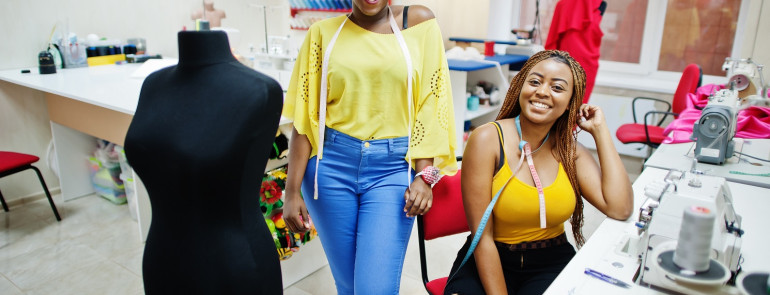Africa’s creative sector is flourishing, brimming with talent and innovation. From fashion to film, music to design, African creatives are making their mark on the global stage. However, despite this progress, there remains a significant gender gap in the industry. Women are often underrepresented and face unique challenges in accessing finance, training, and market opportunities.
Couture Africa explores the gender gap in Africa’s creative industries, highlighting the challenges faced by women and the initiatives working to bridge the divide. We will look at the British Council’s Creative DNA program, which is specifically designed to support women-led fashion businesses in Africa. We will also explore the ACP-EU Ignite Culture Programme, a broader initiative that supports women entrepreneurs in the creative industries across Africa, the Caribbean, and the Pacific.

The Importance of Africa’s Creative Industries
Africa’s creative industries are a powerful driver of economic growth and social development. They create jobs, generate revenue, and promote cultural exchange. The sector is also a vital platform for storytelling and self-expression, allowing Africans to share their unique perspectives with the world.
A report by the World Bank estimates that Africa’s creative industries could contribute up to $30 billion to the continent’s GDP by 2025. The sector is already a significant employer, with millions of Africans working in creative occupations. With the growing popularity of African music, fashion, and film, the creative industries are poised for even greater growth in the years to come.
The Gender Gap in Africa’s Creative Industries
Despite the potential of Africa’s creative industries, women remain underrepresented in the sector. According to a UNESCO report, women make up only 20% of those working in the creative industries in Africa. This gender gap is due to a number of factors, including:
- Lack of access to finance: Women often have difficulty accessing the finance they need to start or grow their creative businesses. Banks and other financial institutions are often reluctant to lend to women-owned businesses, seen as high-risk.
- Lack of training and mentorship: There is a lack of training and mentorship programs specifically designed for women in the creative industries. This can make it difficult for women to develop the skills and knowledge they need to succeed.
- Social norms: In many African societies, there are traditional gender roles that can discourage women from pursuing careers in the creative industries. These careers may be seen as risky or unsuitable for women.
The British Council’s Creative DNA Program
The British Council is a leading organization working to bridge the gender gap in Africa’s creative industries. One of their key initiatives is the Creative DNA program, which is specifically designed to support women-led fashion businesses in Africa. Creative DNA provides a comprehensive package of support to fashion businesses, including:
- Training: The program offers training in business skills, fashion design, and marketing.
- Networking: Creative DNA connects participants with a network of mentors, industry experts, and potential investors.
- Market access: The program helps businesses to access new markets, both in Africa and internationally.
Since its launch in 2018, Creative DNA has supported over 100 women-led fashion businesses in Africa. The program has helped these businesses to create jobs, generate revenue, and gain a foothold in the global fashion industry.
The ACP-EU Ignite Culture Programme
The ACP-EU Ignite Culture Programme is a broader initiative that supports women entrepreneurs in the creative industries across Africa, the Caribbean, and the Pacific. The program provides funding, training, and mentorship to help women-led businesses grow and thrive.
The ACP-EU Ignite Culture Programme is a valuable resource for women in Africa’s creative industries. The program provides the support and resources that women need to overcome the challenges they face and achieve their full potential.

The Way Forward
Bridging the gender gap in Africa’s creative industries is essential for the sector’s continued growth and success. By empowering women entrepreneurs, we can unlock the full potential of Africa’s creative talent. The British Council’s Creative DNA program and the ACP-EU Ignite Culture Programme are just two examples of initiatives that are working to make a difference.
In addition to the challenges and initiatives mentioned above, here are some other factors that are important to consider:
- The role of technology: Technology can play a powerful role in levelling the playing field for women in the creative industries. For example, online platforms can help women to sell their products and services to a global audience.
- The importance of role models: Seeing successful women in the creative industries can inspire other women to pursue their dreams.
- The need for change in social attitudes: Social attitudes about gender roles can play a big part in perpetuating the gender gap in the creative industries. We need to challenge these attitudes and create a more supportive environment for women.
Africa’s creative industries have the potential to be a powerful driver of economic growth and development. However, this potential can only be fully realized if we bridge the gender gap. By supporting women entrepreneurs, we can help to create a more vibrant and inclusive creative sector in Africa.
What are your thoughts on the gender gap in Africa’s creative industries? What can be done to bridge the gap? Share your thoughts in the comments below.

